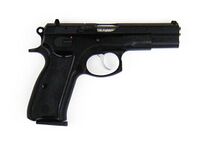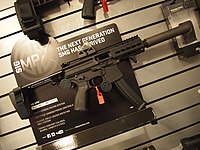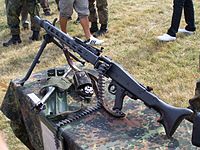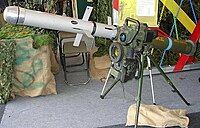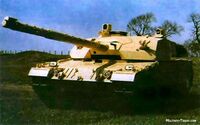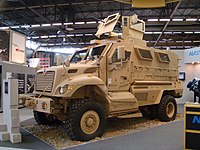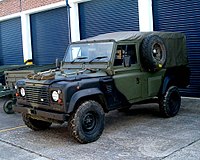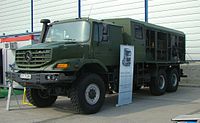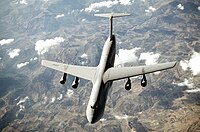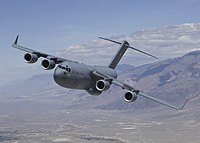Gassasinian Defence Force: Difference between revisions
| Line 126: | Line 126: | ||
| Standard sidearm since 1995, replacing the Browning Hi Power. Limited local production by Zhayed Heavy Industries. | | Standard sidearm since 1995, replacing the Browning Hi Power. Limited local production by Zhayed Heavy Industries. | ||
|- | |- | ||
| | | {{wp|H&K USP|Pistole 93}} | ||
| {{flag|Bakyern}} | | {{flag|Bakyern}} | ||
| [[File:First-year_H&K_USP_9mm_(32415150000)_modified.jpg|center|200px]] | | [[File:First-year_H&K_USP_9mm_(32415150000)_modified.jpg|center|200px]] | ||
| Line 135: | Line 135: | ||
| [[File:Pistol_Auto_9_mm_1A_-_Kolkata_2012-01-23_8779.JPG|center|200px]] | | [[File:Pistol_Auto_9_mm_1A_-_Kolkata_2012-01-23_8779.JPG|center|200px]] | ||
| Standard sidearm until 1995, still sees limited use with the Defence League. Common self-defence weapons for civilians with a firearms license. | | Standard sidearm until 1995, still sees limited use with the Defence League. Common self-defence weapons for civilians with a firearms license. | ||
|- | |||
| {{wp|CZ75}} | |||
| {{flag|[IDK]}} | |||
| [[File:Cz75.jpg|center|200px]] | |||
| Handgun chambered for 9mm, more often seen in use by police and civilians, but also in limited military use. | |||
|- | |- | ||
! style="align: center; background: #A3B6BF;" colspan="4" | Submachine Guns and Carbines | ! style="align: center; background: #A3B6BF;" colspan="4" | Submachine Guns and Carbines | ||
|- | |- | ||
| | | {{wp|H&K MP5|Maschinenpistole M68}} | ||
| {{flag|Bakyern}} | | {{flag|Bakyern}} | ||
| [[File:Heckler_&_Koch_MP5-1.jpg|center|200px]] | | [[File:Heckler_&_Koch_MP5-1.jpg|center|200px]] | ||
| Line 148: | Line 153: | ||
| Newly adopted standard submachine gun of Gassasinian Defence Force and Police. Adopted to phase out the MP5 due to greater modularity. Limited licensed production by Gassasinian Defence Systems. | | Newly adopted standard submachine gun of Gassasinian Defence Force and Police. Adopted to phase out the MP5 due to greater modularity. Limited licensed production by Gassasinian Defence Systems. | ||
|- | |- | ||
| | | {{wp|H%K MP7|Maschinenpistole M03}} | ||
| {{flag|Bakyern}} | | {{flag|Bakyern}} | ||
| [[File:Heckler_&_Koch_MP7A1.jpg|center|200px]] | | [[File:Heckler_&_Koch_MP7A1.jpg|center|200px]] | ||
Revision as of 11:32, 17 September 2020
This article is incomplete because it is pending further input from participants, or it is a work-in-progress by one author. Please comment on this article's talk page to share your input, comments and questions. Note: To contribute to this article, you may need to seek help from the author(s) of this page. |
| Gassasinian Defence Force | |
|---|---|
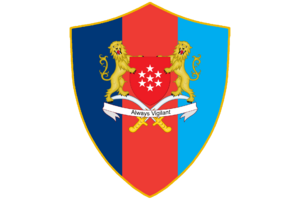 | |
| Service branches |
|
| Leadership | |
| Commander-in-Chief | King Yousef II bin Al-Hashim |
| Minister of Defence | George Aoun |
| Chief of Defence Staff | GEN Mohammed Adib |
| Personnel | |
| Military age | 16 with parental consent, 18 without parental consent and for combat roles. |
| Available for military service | 1,707,694 males, age 15–49, 1,662,099 females, age 15–49 |
| Fit for military service | 2,416,480 males, age 15–49, 2,265,450 females, age 15–49 |
| Active personnel | 120,000 |
| Reserve personnel | 250,000 |
| Expenditure | |
| Budget | $16.13 billion |
| Percent of GDP | 2.5% |
| Industry | |
| Domestic suppliers |
|
| Foreign suppliers | |
The Gassasinian Defence Force is the unified armed forces of Gassasinia, being responsible for defending Gassasinia and its' people from external threats, along with supporting international peacekeeping efforts and humanitarian aid. The current Gassasinian Defence Force was formed in 1980 from the previous Gassasinian Royal Armed Forces, and drew its' commanders, officers and soldiers from a diverse range of backgrounds to ensure that the Gassasinian Defence Force not just represented upper-class Christian interests, but the interests of the people as a whole.
Based on a similar doctrine to [BRITISH]'s armed forces, the the Gassasinian Defence Force is a well-equipped, well-organised and well-trained - albeit small force - relying on effective organisation and technological advantage over more numerous enemies. Officers have much more freedom to act on their own initiative, allowing for greater flexibility on the field compared to other Arab armies who are often constrained out of fear of a military coup. It is well-equipped with a variety of modern armoured armoured fighting vehicles and aircraft developed in [[[EUROPEAN]]] and [[[NORTH AMERICAN]]] and often modified to meet Gassasinian needs. The Gassasinian Defence Force mainly consists of a professional force of volunteer soldiers, with conscription being abolished in 1977 by the Defence Force Act.
The Gassasinian Defence Force is known its' contributions to world-wide peacekeeping operations, having been present in some capacity in a diverse variety of internationally-lead peacekeeping operations since the 1980's. The Gassasinian Defence Force is also important in ensuring internal security in Gassasinia, in particular helping the Gassasinian National Police to patrol the border with #### and co-ordinate counter-terrorist operations.
History
The Royal Gassasinian Armed Forces, the predecessor of the modern day Gassasinian Defence Force, was formed after 1949 from the Royal King's [ARAB]n Rifles Regiment after the fall of imperial rule in Gassasinia. Throughout its' early years, the Royal Gassasinian Armed Forces came to be known as corrupt and elitist - being primarily intended to protect the interests of the [CHRISTIAN] elite - but also fiercely efficient and brutally repressive against those who threatened the Christian order.
In the lead-up to the 1970's, various far-right paramilitary groups who were not officially part of the Gassasinian Royal Armed Forces but often attached to the Royal Gassasinian Police Service were formed, which often worked alongside the army and were responsible for a variety of atrocities before and during the Gassasinian Civil War. Throughout the civil war, the army proved to be highly effective, using a combination of air and ground mobility, and good organisation to effectively push the main paramilitary groups from their hideouts in major cities to the mountains. Although most officers were Christians or Jews, at least half of the basic infantrymen were Muslims who had enlisted for benefits and pay.
It was the very Gassasinian Royal Armed Forces that deposed King Hashim II when in 1975, Prince Yousef II organised a group of low-level officers and foot-soldiers who held liberal views and forced the king to abdicate, allowing Prince Yousef II to take the throne and reform the government.
The Gassasinian Defence Force was formed in 1977 by the Defence Force Act of 1977, with King Yousef II as its' commander-in-chief. From the start, the Gassasinian Defence Force was designed to incorporate not just the [CHRISTIAN] officers of the old army, but officers from a variety of ethno-religious and economic backgrounds, with selection being based on merit rather than status. Although most the soldiers were taken from the old Gassasinian Royal Armed Forces, the army also integrated some former soldiers and officers of more moderate opposition paramilitary groups which had disarmed themselves following the end of the civil war. With [British] help, the Gassasinian Defence Force was retrained and reorganised, and a diverse selection of officers was introduced. While the branches retained their royal title, the Gassasinian Defence Force's name was chosen to represent the people of Gassasinia rather than the Christian monarch, and also to emphasise the defensive nature of the armed forces as a protective precaution of a peaceful nation.
Domestic Suppliers
The principle domestic suppliers for the Gassasinian Defence Force are Gassasinian Defence Systems, Zhayed Heavy Industries and Hacohen Microsystems. Rather than designing its' own arms, the Gassasinian defence industry generally tends to modify and upgrade foreign bought and licensed arms for its' own needs. Although not considered a major arms exporter, Gassasinian does have some arms exports, mainly in the area of electronic suites for electronic suites and modification and upgrades for pre-existing armoured fighting vehicles.
Structure
- Gassasinian Defence Force
- Gassasinian Royal Army - 72,000 Active, 30,000 Reserve, 200,000 Defence League militiamen
- Regular Army
- Royal Artillery Corps
- Royal Armoured Corps
- Royal Army Aviation Corps
- Royal Corps of Air Defence
- Royal Corps of Engineers
- Royal Corps of Signals
- Royal Army Medical Corps
- Infantry
- Parachute Regiment
- Gassasinian Defence League
- Army Cadet Service
- Air Cadet Service
- Naval Cadet Service
- Police Cadet Service
- Civil Defence Cadets
- First Aid Cadets
- Civil Air Patrol
- Regular Army
- Gassasinian Royal Air Force - 36,000 Active, 15,000 Reserve
- No. 1 Fighter Group
- No. 2 Ground Attack Group
- No. 3 Air Combat Support Group
- Gassasinian Royal Navy - 12,000 Active, 5,000 Reserve
- Joint-Branch Services
- Royal Military Intelligence Service
- Royal Military Medical Service
- Gassasinian Royal Army - 72,000 Active, 30,000 Reserve, 200,000 Defence League militiamen
Notable Units
Special Raiding Unit
Parachute Regiment
Women, LGBT+ and Vegans in the Defence Force
Women
As of the Defence Force Act of 1977, women are allowed to serve in combat-positions in the Gassasinian Armed Forces. However - very few women serve within front-line combat roles, instead more often serving in rear-echelon support roles. Studies conducted by the Ministry of Defence in 2005 suggested that women often display greater discipline, motivation and marksmanship, but suffer in physical strength. Despite being legally equal to men in terms of opportunity, women are under-represented in the upper-ranks of the Gassasinian Defence Force. However, despite this disparity, in 2016 Wafiya Nawra al-Hashim became the first female general in the Defence Force.
Under the Equality Act of 2003, the Gassasinian Defence Force not only has the responsibility to subject women to the same treatment as men, but also to actively tackle sex-based discrimination.
LGBT+
Since 1983, homosexuals and bisexuals have been allowed to serve in the Gassasinian Defence Force under a policy of Don't ask, don't tell. However, since 1995 openly gay and bisexual soldiers have been allowed to serve in the Defence Force, with the Equality Act of 2003 introducing sexual orientation and gender identity to the list of protected categories and giving the Defence Force the responsibility of tackling orientation and gender identity-based discrimination. However, in spite of legislation, reports of homophobic and transphobic abuse are still common, albeit have been significantly declining since the early 2000's.
In 2015, the Defence Force admitted its' first transgender male-to-female recruit as a woman.
Vegans
As with the last categories, vegans are required to be given proper accommodation to their needs based on the Equality Act of 2003. Vegans are issued jumpers and berets which are made of synthetic wool as opposed to sheep wool. Furthermore, vegans and vegetarians have access to animal product-free rations and catering.
Gassasinian Defence League
The Gassasinian Defence League is the national reservist militia of the Gassasinian Defence Force, made up of part-time volunteers who attend training sessions alongside Regular Army active-duty and reservist forces. While not as mobile and well-equipped as the Regular Army, the Gassasinian Defence League is still trained to a strong degree and equipped to complete their goal, which is mainly to man defenses around their local area, carry out disruptive guerilla attacks against any occupying force, and also to assist the National Police and Civil Defence Force in times of disaster and unrest.
Unlike the Regular Army, who can be deployed abroad with consent of the Ministry of Defence and usually the Parliament, the Defence League can only be deployed internally. In extreme circumstances, the Defence Force Act of 1977 allows for the Defence League to be folded into the Regular Army as either reservists or active-duty servicemen.
While still having decent standards of entry, the standards of entry for the Defence League are much lighter. As such, many of the Defence League's members are recruits who failed to qualify for the Regular Army. Furthermore, many of the Defence League's members are retired Regular Army servicemen, whose experience is vital in helping to keep the Gassasinian Defence Force trained to a strong degree.
Standard equipment of the Defence League is often a mix of current Regular Army, along with equipment that has since been phased out of use. The main uniform of the Defence League is normal MTP fatigues, or alternatively Multicam fatigues.
The Gassasinian Defence League is responsible for the management of the cadet services, including the Army Cadet Service, Naval Cadet Service and Naval Cadet Service. Furthermore, the Defence League is responsible for the Civil Air Service. While some members of the Defence League's militia do fulfil roles within the cadet services and the Civil Air Service, members of these organisations are not considered either military or paramilitary, and they do not serve either a military or paramilitary role.
Royal Military Intelligence Service
The Royal Military Intelligence Service - often referred to as the "Mukhabarat" - is the main foreign intelligence service of Gassasinia, responsible for collecting and analysing HUMINT abroad and overseas. In particular, the RMIS' interests lie in tracking potential threats to national security from foreign sources, such as rogue states, military movements, terrorist groups and Weapons of Mass Destruction. The Royal Military Intelligence Service is restricted by legislation in its' ability to spy on individuals and groups within Gassasinia's border, relying instead on its' partners within the National Police, the Counter-Terrorist Command, Internal Security Department and Constitutional Protection Department, who make up the National Security Council.
Uniform
Standard uniform for the Gassasinian Defence Force consists of Multi Terrain Pattern fatigues, acquired through a mix of licensed production and foreign purchase, which are worn either with a field cap or boonie hat for work-purposes, or a beret coloured in correspondence with one's unit when on ceremonial and parade duties. When wearing the field-shirt for non-combat work duties, the left shoulder of the uniform bears the soldier's unit patch, whereas the right shoulder bears an IR patch of the national flag in tan and olive green colours. Additionally, on the left breast of the field-shirt is a name-tape reading the soldier's surname along with a tape on the right breast reading "GASSASINIA." Tankists and vehicle crews are issued jumpsuit coveralls and an olive green [AMERICAN] tank helmet.
Often soldiers on office work and non-combat work in colder temperatures will wear a green Commonwealth-type Woolly Pully.
Often when wearing combats, instead of wearing a field shirt soldiers will wear a half-zip combat shirt. Along with this, for protection soldiers are issued [BRITISH] Mark 4 Osprey Body Armour and a Mark 7 helmet. Alternatively for less-intensive roles or other cases where full load isn't needed, troops are issued with an MTP [BRITISH]-styled harness.
Multi-terrain Pattern was adopted in 2010, replacing the tropical DPM pattern fatigues used previously. Multicam was previously adopted in 2005 in limited numbers for testing, and then in larger numbers as a stop-gap measure until MTP fatigues could be issued. To this day, Multicam is still used by Defence League militiamen to supplement Multi-Terrain Pattern
Equipment
Small-arms
| Name | Country | Image | Notes |
|---|---|---|---|
| Handguns | |||
| Glock 17 | flag/core|name=[AUSTRIA]|variant=|size=}} | Standard sidearm since 1995, replacing the Browning Hi Power. Limited local production by Zhayed Heavy Industries. | |
| Pistole 93 | Standard sidearm for certain special forces and armed police units. | ||
| Browning Hi Power | flag/core|name=[BRITISH]|variant=|size=}} | Standard sidearm until 1995, still sees limited use with the Defence League. Common self-defence weapons for civilians with a firearms license. | |
| CZ75 | flag/core|name=[IDK]|variant=|size=}} | Handgun chambered for 9mm, more often seen in use by police and civilians, but also in limited military use. | |
| Submachine Guns and Carbines | |||
| Maschinenpistole M68 | Standard submachine gun of the Gassasinian Defence Force, being phased out in favour of the new SIG MPX. Locally produced under license by Zhayed Heavy Industries until 2015, when it was decided that it would be replaced due to it being considered outdated. | ||
| MPX | [AUSTRIA] | Newly adopted standard submachine gun of Gassasinian Defence Force and Police. Adopted to phase out the MP5 due to greater modularity. Limited licensed production by Gassasinian Defence Systems. | |
| Maschinenpistole M03 | The MP M03 is used in tandem with the MPX and MP M68. The MP M03 is well-liked thanks to its' PDW cartridge that can penetrate soft body armour. | ||
| Shotguns | |||
| Benelli M3 | flag/core|name=[ITALY]|variant=|size=}} | Standard shotgun of the Gassasinian Defence Force and Police. Preferred thanks to its' dual semi-automatic or pump action mode. | |
| Assault and Battle Rifles | |||
| Gassasinian Defence Systems MARS-L | Standard rifle of the Gassasinian Defence Force, replacing the M16A1 in 1995. Built upon the AR15 platform, featuring a variety of barrel lengths and the ability to fit a variety of modular attachments. | ||
| M16A2 | flag/core|name=[AMERICAN]|variant=|size=}} | Standard rifle of the Gassasinian Defence Force of the Gassasinian Defence Force between 1965 and 1995, when it was phased out in favour of the MARS-L Rifle. Some M16A2 rifles are mainly still in use with the National Police and Defence League, fitted with a modular picatinny handguard to mount attachments, and drilled to fit a sight mount. | |
| Feldgewehr M13/Feldgewehr M13A1 | The FG M13 assault rifle and its' battle rifle counterpart, the FG M13A1, are both used by certain special forces and police units. | ||
| Feldgewehr M67 | The M67 was phased out between the mid 1960s and the early 2000s in favour of more modern assault rifles. M67 rifles were handed down to the Defence League and National Police, albeit upgraded to the AG-3F2 standard with a Zhayed Heavy Industries designed modular picatinny rail handguard and sight mount to allow for the attachment of modern modula attachments such as handguards and optical sights. | ||
| Machine Guns | |||
| Zhayed Heavy Industries Ultimax 100 | The Ultimax 100 is an indigenously designed light machine gun dating back to the late 1970s. Although the design was finished in 1982, it only started production in 1987 due to political troubles. Phased out the FN MAG as the standard Squad Automatic Weapon. | ||
| FN MAG | flag/core|name=[BRITISH]|variant=|size=}} | The FN MAG is the main general-purpose machine gun of the Gassasinian Defence Force. As of the 1990's, it has been mostly phased out in the Squad Automatic Weapon role but still sees significant use in other roles. | |
| Maschinengewehr M76 | The MG76 is used in limited roles, specifically as a dedicated anti-infantry mounted machine gun for fortifications. | ||
| Sniper and Marksman Rifles | |||
| Zhayed Heavy Industry 308 MWS | Sharpshooter rifle based upon the AR10 platform. | ||
| Accuracy International AWM/Accuracy International | flag/core|name=[BRITISH]|variant=|size=}} | Sniper rifle, 7.62 or .338 Lapua. | |
| M82A1 Barrett | flag/core|name=[AMERICAN]|variant=|size=}} | Heavy anti-material rifle. | |
| Name | Country | Image | Notes |
|---|---|---|---|
| Panzerraketenwerfer M78 | Standard AT weapon of infantry units. | ||
| RPAW T98 | |||
| Spike |
Ground Vehicles
| Name | Country | Image | Quantity | Notes |
|---|---|---|---|---|
| Tanks | ||||
| Challenger 2 | Vescarium | 250 | Updated to "Challenger-2GA" standard using locally produced electronics and sensors by Gassasinian Defence Industries and Hacohen Microsystems. Fitted with Depleted Uranium armour | |
| Vickers Mark 7 | Vescarium | 350 | Updated to "Vickers-7GA" standard using locally produced electronics and sensors by Gassasinian Defence Industries and Hacohen Microsystems. Mid-tier tank, capable of competing well with older tanks seen in use with many [ARAB]n countries but inferior to most modern tanks such as the Challenger 2 and the Leopard 2. | |
| Infantry Fighting Vehicles | ||||
| LAV IV | flag/core|name=[AMERICAN]|variant=|size=}} | 269 | Modified to use a suite of Gassasinian-designed electronics systems and sensors. | |
| Schutzenpanzer M20 | 269 | Modified to use a suite of Gassasinian-designed electronics systems and sensors. | ||
| M1117 Armoured Security Vehicle | flag/core|name=[AMERICAN]|variant=|size=}} | 140 | Modified to use a suite of Gassasinian-designed electronics systems and sensors. | |
| Armoured Personnel Carriers | ||||
| Kampffahrzeug SA32 | 164 | Modified to use a suite of Gassasinian-designed electronics systems and sensors. | ||
| Schutzenpanzer M79 | 1050 | Modified to utilise indigenously designed and produced sensors, electronics and modular armour systems. | ||
| Mine-Resistant Ambush Protected Vehicles | ||||
| MaxxPro MRAP | flag/core|name=[AMERICAN]|variant=|size=}} | 262 | ||
| Utility Vehicles | ||||
| Land Rover Wolf | flag/core|name=[BRITISH]|variant=|size=}} | |||
| Humvee | flag/core|name=[AMERICAN]|variant=|size=}} | |||
| HMHV | ||||
| Benfer Z-Class | ||||
Aircraft
| Name | Country | Image | Quantity | Notes |
|---|---|---|---|---|
| Combat Aircraft | ||||
| E-40 | 50 | Multi-role fighter-bomber, many are older production block models which have been upgraded by Hacohen Microsystems. | ||
| MkF3 | 120 | Multi-role fighter-bomber, many are older production block models which have been upgraded by Hacohen Microsystems. | ||
| MkF18 | 12, 12 on order | Multi-role stealth fighter, local modifications to utilise locally-produced armaments, electronic warfare suites and sensors produced by Hacohen Microsystems and Gassasinian Defence Systems. | ||
| MkP 98 SF IDS/ECR | 40/20 | Strike fighter acquired from former Bakyern service. Twenty aircraft converted to ECR variant with modern electronic warfare systems. Both variants upgraded with modern systems produced indigenously. | ||
| AEW&C | ||||
| HM-2075 707 AEW&C | 3 | Modified Morek FA-164 fitted with Gassasinian electronics, sensors and radar. | ||
| Reconnaissance | ||||
| Morek ES-83 | 2 | Surveillance, SIGINT and ELINT | ||
| Beechcraft Super King Air | flag/core|name=[AMERICAN]|variant=|size=}} | 
|
3 | Equipped with surveillance and ELINT equipment. |
| Tanker | ||||
| Morek FA-164 | 5 | Boeing 707 modified for aerial refuelling. | ||
| Transport | ||||
| M-12 | 12 | Transport and SAR | ||
| M-12A | 6 | Tactical Airlift | ||
| M-42 | 2 | Strategic Airlift, mainly used for international humanitarian and peacekeeping operations. | ||
| M-33 | 6 | Strategic and tactical airlift. | ||
| Morek FA-164 | 6 | Troop and VIP transport. | ||
| Beechcraft Super King Air | flag/core|name=[AMERICAN]|variant=|size=}} | 
|
44 | Utility, transport and maritime patrol |
| Trainer | ||||
| BAE Systems Hawk | flag/core|name=[BRITISH]|variant=|size=}} | 25 | Advanced jet trainer | |
| Nasser X209 | 44 | Basic propeller trainer | ||
| Beechcraft T-6 Texan II | flag/core|name=[AMERICAN]|variant=|size=}} | 40 | Intermediate propeller trainer | |
| UAV | ||||
| RV-18 Heretic | 12 | Reconnaissance and air-strike | ||
Helicopters
| Name | Country | Image | Quantity | Notes |
|---|---|---|---|---|
| Transport Helicopter | ||||
| Sikorsky UH-60 | flag/core|name=[AMERICAN]|variant=|size=}} | 200 | ||
| CH-47 Chinook | flag/core|name=[AMERICAN]|variant=|size=}} | 14 | Heavy lift and transport | |
| UH-1 Huey | flag/core|name=[AMERICAN]|variant=|size=}} | 150 | ||
| Scout Helicopter | ||||
| Bell OH-58 Kiowa | flag/core|name=[AMERICAN]|variant=|size=}} | 70 | ||
| Attack Helicopter | ||||
| AH-64 Apache | flag/core|name=[AMERICAN]|variant=|size=}} | 40 | ||
| Name | Country | Image | Quantity | Notes |
|---|---|---|---|---|
| Frigate | ||||
| Corvette | ||||
| Fast Attack Craft | ||||
| Support Ship | ||||




